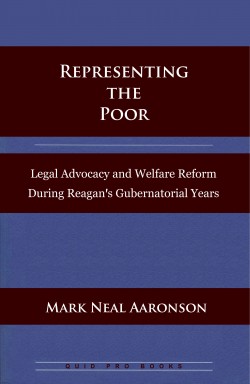Mark Aaronson Examines Representing the Poor Against Governor Reagan’s Welfare Reforms
An extended, multifaceted case study of a kind not much found in the literature on social cause lawyering. The narrative highlights the forceful presence of California Governor Ronald Reagan and the pivotal role in representing the welfare poor of Ralph Santiago Abascal, a government-funded legal aid attorney and social reform leader. To fight Reagan’s ambitious welfare policy initiatives, Abascal with other legal services lawyers effected meaningful legal change. In joint cause with recipient-led welfare rights organizations, he relied on court litigation not in isolation but as part of an overall strategy that also involved legislative and administrative actions.
The empirical landscape of this book is the contentious political and legal battle over California welfare reform in the early 1970s. Within the context of American pluralism and constitutionalism, and from an analytical perspective, this study examines the professional and institutional character of group legal representation for the poor as a strategy for political empowerment and social change. While grounded in political and legal history, the book’s conceptual approaches primarily draw on ideas from political science and theory about political representation, and from writings in legal ethics and legal education on professional role responsibilities in the legal representation of people and the groups they are a part of.
pluralism and constitutionalism, and from an analytical perspective, this study examines the professional and institutional character of group legal representation for the poor as a strategy for political empowerment and social change. While grounded in political and legal history, the book’s conceptual approaches primarily draw on ideas from political science and theory about political representation, and from writings in legal ethics and legal education on professional role responsibilities in the legal representation of people and the groups they are a part of.
These principal thematic points emerge, and are supported by prodigious empirical research, experience, and theory: (1) Social cause lawyering is a systemic necessity for the democratic and equitable functioning of our governing institutions; (2) the client constraints on the role of lawyers for groups or causes have more to do conceptually with understandings about the nature of representation than the applicability of ethical or procedural rules; and (3) the political consequences of such legal advocacy are variable and potentially contradictory. Exploring these dilemmas through the story of anti-poverty representation and reform, the author provides a meaningful context to consider the legal representation of the poor beyond mere lawsuits, legal doctrine, and the ubiquitous popular image of the “welfare queen.”
The book also features an extended, fascinating, and telling interview with then-Governor Reagan about his plans for welfare reform and the roadblocks and stories he encountered along the way. This new book develops the research and theory first documented in the author’s much-cited but formally unpublished Berkeley doctoral dissertation, entitled “Legal Advocacy and Welfare Reform: Continuity and Change in Public Relief” (1975), which is now finally readily available worldwide — in this extensive revision and fresh look at the seismic changes to welfare systems and conceptions of poverty that began in the 1970s.
Ebook edition now available in all leading formats:
Amazon for Kindle.
Barnes & Noble for Nook.
Google for Google Play, and more generally at Google Books.
Apple iTunes and iBooks, direct on iPad and iPhone.
And at Smashwords in ePUB format. Also, look for it in ePUB at Kobobooks.
…
CATALOGING:
Representing the Poor: Legal Advocacy and Welfare Reform During Reagan’s Gubernatorial Years
ISBN 9781610278621 (ePUB)
Page count: 190 pp.
List price: US $6.99; UK 4.99 Pounds; Euro 5.99



